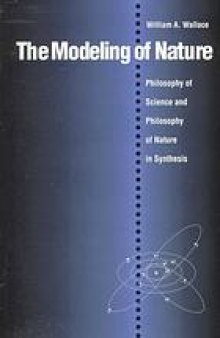 جزییات کتاب
جزییات کتاب
As the new millennium approaches, our scientific knowledge of the universe surpasses that of any previous age. Yet, paradoxically, the philosophy of science movement is now in disarray. The collapse of logical empiricism and the rise of historicism and social constructivism have effectively left all of the sciences without an epistemology. The claims of realism have become increasingly difficult to justify, and, for many, the only alternatives are probabilism, pragmatism, and relativism.But the case is not hopeless. According to William A.Wallace, a return to a realist concept of nature is plausible and, indeed, much needed. Human beings have a natural ability to understand the world in which they live. Many have suggested this understanding requires advanced logic and mathematics. Wallace believes that nature can more readily be understood with the aid of simple modeling techniques.Through an ingenious use of iconic and epistemic models, Wallace guides the reader through the fundamentals of natural philosophy, explaining how the universe is populated with entities endowed with different natures― inorganic, plant, animal, and human. Much of this knowledge is intuitive, already in people's minds from experience, education, and exposure to the media. Wallace builds on this foundation, making judicious use of cognitive science to provide a model of the human mind that illuminates not only the philosophy of nature but also the logic, psychology, and epistemology that are prerequisite to it.With this background, Wallace sketches a history of the philosophy of science and how it has functioned traditionally as a type of probable reasoning. His concern is to go beyond probability and lay bare the epistemic dimension of science to show how it can arrive at truth and certitude in the various areas it investigates. He completes his study with eight case studies of certified scientific growth, the controversies to which they gave rise, and the methods by which they ultimately were resolved.The Modeling of Nature provides an excellent introduction to the fundamentals of natural philosophy, psychology, logic, and epistemology.William A. Wallace has taught philosophy of science at the University of Maryland since 1988. For twenty-five years prior to that, he taught both the philosophy and history of science at The Catholic University of America. He served with distinction as a naval officer during World War II, following which he entered the Dominican Order, being ordained a priest in 1953. He has published sixteen books and more than three hundred scholarly articles.
 درباره نویسنده
درباره نویسنده

ویلیام والاس (به انگلیسی: William Wallace) (زاده ۱۲۷۲ - درگذشته ۲۳ اوت ۱۳۰۵) از شوالیهها و ملاکان اسکاتلندی بود که به خاطر رهبری مقاومت اسکاتلندیها در جریان جنگ استقلال اسکاتلند معروفیت یافته و امروزه در اسکاتلند از او به عنوان یک میهنپرست و قهرمان ملی یاد میشود.
 دانلود کتاب
دانلود کتاب
 جزییات کتاب
جزییات کتاب
 درباره نویسنده
درباره نویسنده
 ویلیام والاس (به انگلیسی: William Wallace) (زاده ۱۲۷۲ - درگذشته ۲۳ اوت ۱۳۰۵) از شوالیهها و ملاکان اسکاتلندی بود که به خاطر رهبری مقاومت اسکاتلندیها در جریان جنگ استقلال اسکاتلند معروفیت یافته و امروزه در اسکاتلند از او به عنوان یک میهنپرست و قهرمان ملی یاد میشود.
ویلیام والاس (به انگلیسی: William Wallace) (زاده ۱۲۷۲ - درگذشته ۲۳ اوت ۱۳۰۵) از شوالیهها و ملاکان اسکاتلندی بود که به خاطر رهبری مقاومت اسکاتلندیها در جریان جنگ استقلال اسکاتلند معروفیت یافته و امروزه در اسکاتلند از او به عنوان یک میهنپرست و قهرمان ملی یاد میشود. 








 این کتاب رو مطالعه کردید؟ نظر شما چیست؟
این کتاب رو مطالعه کردید؟ نظر شما چیست؟
